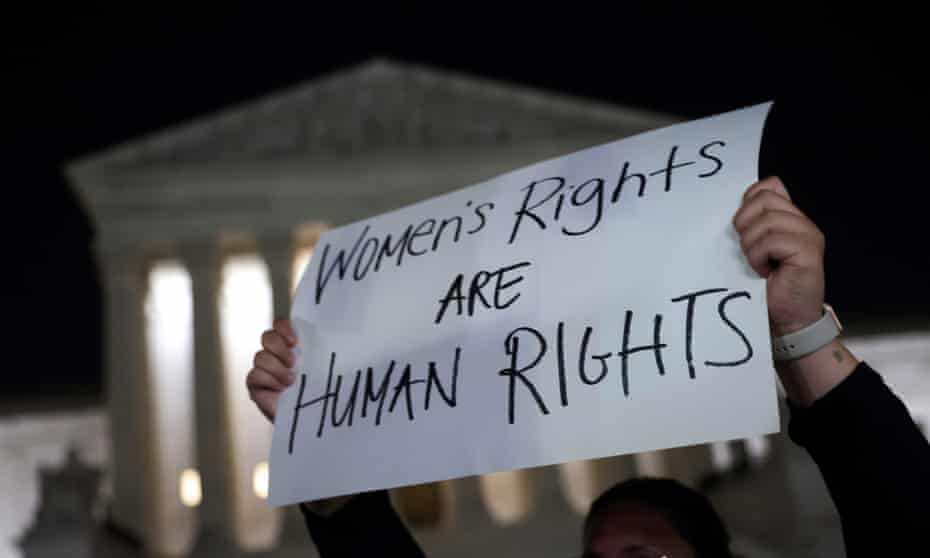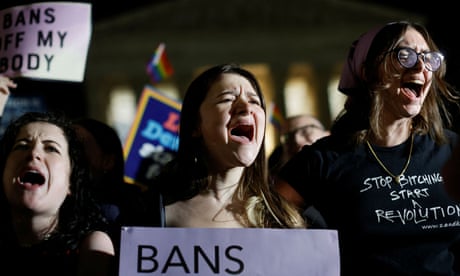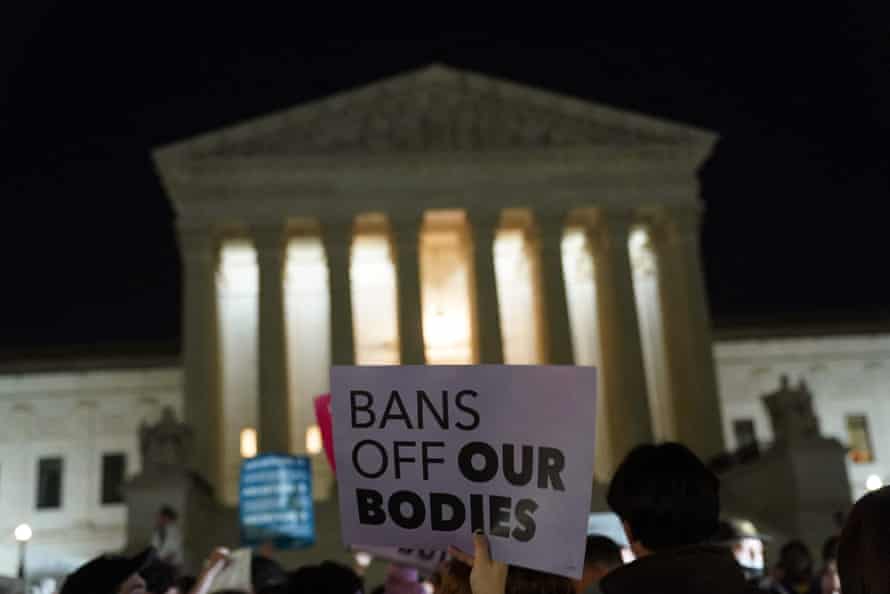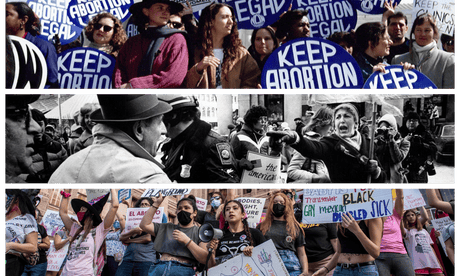Moira Donegan
THE GUARDIAN
There is no condition more essential to democratic citizenship than a person’s control over her own body. We can’t call ourselves a free country without it

‘This will make women prisoners to their own bodies, and to men’s ideas of what those bodies must mean. It will make our country weaker, crueler, stupider and less vibrant.’
Photograph: Kevin Dietsch/Getty Images
Tue 3 May 2022
It’s the worst possible outcome: according to a draft majority opinion published by Politico, the US supreme court has voted to overturn Roe v Wade, along with its sister decision Planned Parenthood v Casey. This momentous ruling will result in abortion becoming immediately illegal in an estimated 26 states when it is officially issued, probably sometime next month.
The draft opinion, authored by Samuel Alito, the most rabidly hateful member of the court’s arch-conservative wing, will upend 50 years of precedent and undo a landmark ruling that has profoundly shaped legal doctrine, popular conceptions of the law, and millions of American lives. It will make women prisoners to their own bodies, and to men’s ideas of what those bodies must mean. It will make our country weaker, crueler, stupider and less vibrant.
Before the court heard oral arguments in the case Dobbs v Jackson, a challenge to a Mississippi law that bans abortion after 15 weeks’ gestational age, some court watchers – mostly male – predicted that this outcome was unlikely. They chin-strokingly declared that judicial nominees like Amy Coney Barrett or Neil Gorsuch were really moderates (both have signed on to the draft opinion) or that chief justice John Roberts’ incrementalist impulses would temper the passions of his more misogynist colleagues.

Supreme court voted to overturn Roe v Wade abortion law, leaked draft opinion reportedly shows
Feminists, meanwhile, were more consistent in measuring the depth of the right’s commitment to sexism and more perceptive in understanding the implications for other areas of the law in a world without Roe.
But after oral arguments on 1 December, even those pundits who were most committed to their performance of sophisticated calm had to admit that there was little doubt that this would be the outcome. The hearing, whose audio was live-streamed to the public, turned into a carnival of delusional hypotheticals and nodding insistence on the triviality of precedent.
Amy Coney Barrett asked why women needed abortion, now that “safe haven” laws allowed for new mothers to surrender newborns without being arrested. Kavanaugh rattled off long lists all the decisions that the court had overturned in the past. It was a joke, a festival of misogyny, an unserious legal formality providing a gossamer of legitimacy for a preordained outcome. Roe would be overturned.
In a way, the leaked opinion didn’t tell us anything we did not already know: these are the last days of reproductive freedom in America, and most states will soon ban abortion outright, or restrict it so onerously that it is inaccessible within their borders. But Alito’s draft opinion nevertheless represents about as odiously maximalist an approach as the court could have taken.
Advertisement
The opinion does not just overturn Roe and Casey; it expresses outright contempt for the notion that the constitution protects bodily autonomy for women. It articulates a rigid and unchanging vision of individual rights, one in which only those freedoms with robust historical precedent and explicit enumeration in the text of the constitution will be recognized by the court.
It’s the worst possible outcome: according to a draft majority opinion published by Politico, the US supreme court has voted to overturn Roe v Wade, along with its sister decision Planned Parenthood v Casey. This momentous ruling will result in abortion becoming immediately illegal in an estimated 26 states when it is officially issued, probably sometime next month.
The draft opinion, authored by Samuel Alito, the most rabidly hateful member of the court’s arch-conservative wing, will upend 50 years of precedent and undo a landmark ruling that has profoundly shaped legal doctrine, popular conceptions of the law, and millions of American lives. It will make women prisoners to their own bodies, and to men’s ideas of what those bodies must mean. It will make our country weaker, crueler, stupider and less vibrant.
Before the court heard oral arguments in the case Dobbs v Jackson, a challenge to a Mississippi law that bans abortion after 15 weeks’ gestational age, some court watchers – mostly male – predicted that this outcome was unlikely. They chin-strokingly declared that judicial nominees like Amy Coney Barrett or Neil Gorsuch were really moderates (both have signed on to the draft opinion) or that chief justice John Roberts’ incrementalist impulses would temper the passions of his more misogynist colleagues.

Supreme court voted to overturn Roe v Wade abortion law, leaked draft opinion reportedly shows
Feminists, meanwhile, were more consistent in measuring the depth of the right’s commitment to sexism and more perceptive in understanding the implications for other areas of the law in a world without Roe.
But after oral arguments on 1 December, even those pundits who were most committed to their performance of sophisticated calm had to admit that there was little doubt that this would be the outcome. The hearing, whose audio was live-streamed to the public, turned into a carnival of delusional hypotheticals and nodding insistence on the triviality of precedent.
Amy Coney Barrett asked why women needed abortion, now that “safe haven” laws allowed for new mothers to surrender newborns without being arrested. Kavanaugh rattled off long lists all the decisions that the court had overturned in the past. It was a joke, a festival of misogyny, an unserious legal formality providing a gossamer of legitimacy for a preordained outcome. Roe would be overturned.
In a way, the leaked opinion didn’t tell us anything we did not already know: these are the last days of reproductive freedom in America, and most states will soon ban abortion outright, or restrict it so onerously that it is inaccessible within their borders. But Alito’s draft opinion nevertheless represents about as odiously maximalist an approach as the court could have taken.
Advertisement
The opinion does not just overturn Roe and Casey; it expresses outright contempt for the notion that the constitution protects bodily autonomy for women. It articulates a rigid and unchanging vision of individual rights, one in which only those freedoms with robust historical precedent and explicit enumeration in the text of the constitution will be recognized by the court.

Pro-choice activists gather at the US supreme court in Washington DC after a leaked draft of a majority opinion that would shred nearly 50 years of constitutional protections on abortion.
Photograph: Stefani Reynolds/AFP/Getty Images
This an interpretation that, if carried to its logical conclusion, would eradicate many of Americans’ other rights that the court has recognized based on so-called substantive due process concerns, among them the right to contraception, the right to gay marriage, and the decriminalization of gay sex. The end of legal abortion will not be where the court’s reactionaries stop. They aim to hurt, punish and narrow the lives of Americans in many more cruel and inventive ways.
The sudden illegality of abortion in most states come June will also create new legal landmines that will rapidly erode other individual rights. As women cross state borders for care, red states will try to limit interstate travel. As activists send abortion pills through the mail, aggressive searches and seizures of packages and personal belongings will become more frequent.
As women find ways to end their pregnancies, many of them will be arrested on criminal charges and some of them will be convicted. As doctors face patients with life-threatening pregnancy complications, many of them will not know what they are legally permitted to do, and in fear, they will let their patients die. Some of those who make the other choice, and help their patients live, will be arrested.
All of this will create legal precedents that erode American freedom, making life more burdensome, more brutish and less safe.
There are ways to fight. Of course, legal rulings aside, American women do not derive their moral right to control their own bodies from the US supreme court; they derive it from their human dignity. And many of them will seek and provide abortions, whether the court likes it or not, in accordance with this higher, more noble law. Others will donate to the abortion funds that will be in dire need of support as costs and demand soar. Still others will spread the word about organizations like Plan C, which mails abortion pills to women in the US from abroad.

A ‘fundamental’ right: a timeline of US abortion rights since Roe v Wade
Some will call their senators, and demand that the US Senate seize upon this moment of popular outrage to abolish the filibuster and pass the Women’s Health Protection Act before the moment fades and it’s too late. And some will call their state representatives and urge them to adopt the most aggressive pro-choice laws possible, in advance of what is coming.
But none of this changes the fact that the reversal of Roe will come at an intolerable human cost. Abortion has so frequently been spoken of as a “high stakes” or “hot button” political issue that it is easy to lose sight of the foundational dignity that the right provides to women and others. The state compelling a person to be pregnant is not like compelling her to pay taxes. The event doesn’t occur in a courtroom or on a balance sheet; it occurs inside her body.
The question at hand is whether half of the country will have control over their own insides, or whether the government can be so intimately evil that it can enforce its vision of gender conformity even within its citizens’ own organs. It is a question of whether an individual American can have the dignity and the freedom to choose her own family, to maintain her own health, and to shape the course of her own life – or whether that freedom is withheld based on her sex.
Some have raised doubts about whether America can call itself a democracy, now that policymaking power has been largely taken over by the unelected courts – whose decisions, like this one, are so radically out of step with, and indifferent to, public opinion. But it is also worth wondering whether any country can call itself a democracy that does not protect abortion rights.
In making abortion illegal, the court is imposing a legal status that is so cruel, so personal and so life-altering on half its population, that those subject to this imposition cannot be called free. Is there any condition more essential to democratic citizenship than a person’s control over her own body? Can we call ourselves a free country without it?
Moira Donegan is a Guardian US columnist
This an interpretation that, if carried to its logical conclusion, would eradicate many of Americans’ other rights that the court has recognized based on so-called substantive due process concerns, among them the right to contraception, the right to gay marriage, and the decriminalization of gay sex. The end of legal abortion will not be where the court’s reactionaries stop. They aim to hurt, punish and narrow the lives of Americans in many more cruel and inventive ways.
The sudden illegality of abortion in most states come June will also create new legal landmines that will rapidly erode other individual rights. As women cross state borders for care, red states will try to limit interstate travel. As activists send abortion pills through the mail, aggressive searches and seizures of packages and personal belongings will become more frequent.
As women find ways to end their pregnancies, many of them will be arrested on criminal charges and some of them will be convicted. As doctors face patients with life-threatening pregnancy complications, many of them will not know what they are legally permitted to do, and in fear, they will let their patients die. Some of those who make the other choice, and help their patients live, will be arrested.
All of this will create legal precedents that erode American freedom, making life more burdensome, more brutish and less safe.
There are ways to fight. Of course, legal rulings aside, American women do not derive their moral right to control their own bodies from the US supreme court; they derive it from their human dignity. And many of them will seek and provide abortions, whether the court likes it or not, in accordance with this higher, more noble law. Others will donate to the abortion funds that will be in dire need of support as costs and demand soar. Still others will spread the word about organizations like Plan C, which mails abortion pills to women in the US from abroad.

A ‘fundamental’ right: a timeline of US abortion rights since Roe v Wade
Some will call their senators, and demand that the US Senate seize upon this moment of popular outrage to abolish the filibuster and pass the Women’s Health Protection Act before the moment fades and it’s too late. And some will call their state representatives and urge them to adopt the most aggressive pro-choice laws possible, in advance of what is coming.
But none of this changes the fact that the reversal of Roe will come at an intolerable human cost. Abortion has so frequently been spoken of as a “high stakes” or “hot button” political issue that it is easy to lose sight of the foundational dignity that the right provides to women and others. The state compelling a person to be pregnant is not like compelling her to pay taxes. The event doesn’t occur in a courtroom or on a balance sheet; it occurs inside her body.
The question at hand is whether half of the country will have control over their own insides, or whether the government can be so intimately evil that it can enforce its vision of gender conformity even within its citizens’ own organs. It is a question of whether an individual American can have the dignity and the freedom to choose her own family, to maintain her own health, and to shape the course of her own life – or whether that freedom is withheld based on her sex.
Some have raised doubts about whether America can call itself a democracy, now that policymaking power has been largely taken over by the unelected courts – whose decisions, like this one, are so radically out of step with, and indifferent to, public opinion. But it is also worth wondering whether any country can call itself a democracy that does not protect abortion rights.
In making abortion illegal, the court is imposing a legal status that is so cruel, so personal and so life-altering on half its population, that those subject to this imposition cannot be called free. Is there any condition more essential to democratic citizenship than a person’s control over her own body? Can we call ourselves a free country without it?
Moira Donegan is a Guardian US columnist
No comments:
Post a Comment